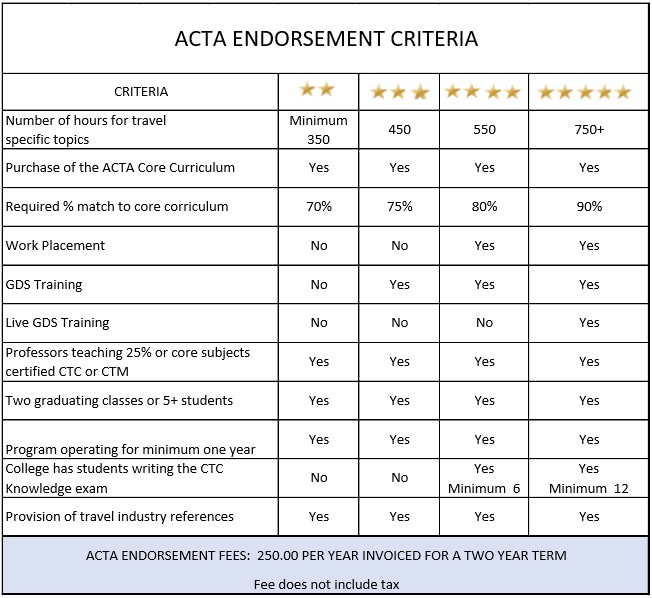Choosing a Travel School
Before you select a travel school, do the following research. It is well worth the effort as selecting a travel school is a critically important decision that will have a big influence on your career.
Your choices include Distance Learning and Full-time programs endorsed by ACTA.
About the School
- Is the school licensed by the provincial government?
- How long has the school been in existence?
- How long has the travel program been in existence?
- Is the school a Better Business Bureau member?
- Have complaints been registered against the school?
About the Faculty
- Are the instructors certified?
- What designations do they hold?
- What travel industry experience do they have?
- What previous teaching experience do they have?
- How long have they been teaching the program?
About the Travel Program
- Is the program based on the Travel Industry-led ACTA Core Curriculum?
- What is the duration of the travel program?
- Does this include a work practicum? How long?
- What type of automation system is being taught?
- How many computer terminals do they have?
- What textbooks are being used?
- What is the placement record for graduates?
- Where are graduates placed?
Recommended Subject and Hours
Based on the Travel Industry recognized Core Curriculum and occupational standards, ACTA recommends that travel training programs offer instruction in the following subject areas:
- Promote Tourism
- Administer Client Bookings
- Exhibit Professionalism
- Office Administration
- Communication Skills
- Sales and Service Skills
- Identify Travel Destinations
- Research Travel Destinations
- Product Knowledge-Accommodation
- Product Knowledge-Air
- Product Knowledge-Cruise
- Product Knowledge-Ground (Rail and Cars)
- Product Knowledge-Insurance
- Product Knowledge-Tour
In general, curriculum hours should be spent on:
- Professionalism subjects 5%
- Administer Travel Bookings 35%
- Sales-Customer Service 25%
- Travel Products 35%
Many travel programs include non-travel services specific topics such as event planning, a second language, job search skills or computer skills that add to the overall value of the program.
Endorsement Criteria
Each level of endorsement must meet certain criteria in order to be endorsed.

Provisional Endorsement
If a travel program does not meet all the criteria for Full Endorsement then Provisional Endorsement may be granted for a maximum of two years, while they work towards satisfying the additional criteria. Examples of criteria that may need to be met include:
- the educational institution must have offered the travel program for a minimum of two years or two graduating classes
- at least one faculty member shall hold a designation at the CTC, ACTC or CTM level.








